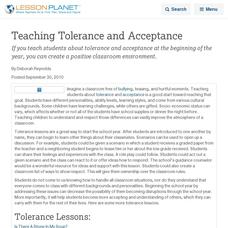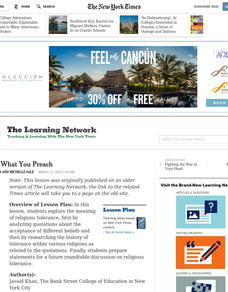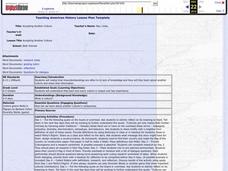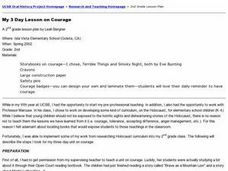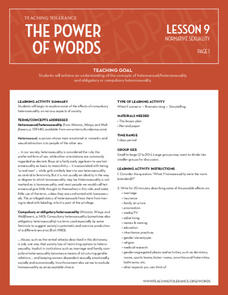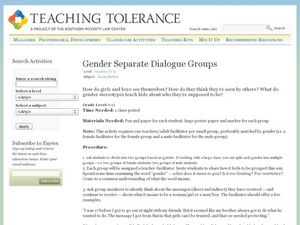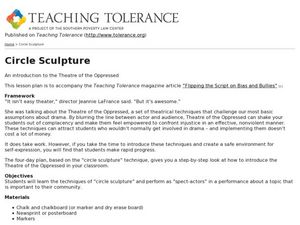Curated OER
Teaching Tolerance and Acceptance
If you teach students about tolerance and acceptance at the beginning of the year, you can create a positive classroom environment.
Curated OER
Gay, Lesbian Speakers: Teaching Tolerance To Intolerant
Students research what has happened in other high schools with gay or lesbian speakers. They survey students about what they believe the issues are in school.Students present a proposal for a speaker on this topic to the appropriate...
Curated OER
The Crayon Box that Talked: Welcoming Indviduality
Just like a box of crayons, every child has a special way of contributing to the greater picture.
Curated OER
No Name Calling
Young scholars use literacy skills to gain information about tolerance. In these lessons on acceptance, student read stories, answer questions, survey students, and plan a citizenship week to encourage participation in a No Name Calling...
Curated OER
Practice What You Preach
Young scholars explore the meaning of religious tolerance, first by analyzing quotations about the acceptance of different beliefs and then by researching the history of tolerance within various religions as related to the quotations.
Council for the Curriculum, Examinations and Assessment
Feelings and Emotions
Eighth graders express their emotions with a set of activities about self reflection and feelings. With a set of emotion cards and a worksheet that details negative thought patterns, the resource empowers young learners to discover and...
Curated OER
Accepting Another Culture
Young scholars explore cultural diversity. In this cultural acceptance lesson, students read Molly's Pilgrim and examine the message of the story. Young scholars research other cultures and create culture-grams and complete research...
Curated OER
It Can't Happen Here or Can It?: Peer Pressure, Prejudice and Intolerance
Middle schoolers examine the pressures of group-pressured behavior. In this teaching tolerance lesson, students read literature and view videos regarding negative group behavior. Middle schoolers answer comprehension questions and...
Curated OER
My 3 Day Lesson on Courage
Second graders focus on what having courage means. They listen to a story about the Holocaust, then create posters which reflect courage, tolerance and acceptance.
Teaching Tolerance
The Power of Words: Normative Sexuality
Students collect newspaper articles which discuss societies who enforce heterosexuality. They brainstorm how heterosexuality is enforced in their community. They answer questions to end the instructional activity.
Curated OER
Gender Separate Dialogue Groups
Students complete studies to learn about tolerance for gender groups. In this gender study instructional activity, students are divided into gender groups and discuss how it feels to be grouped that way. Students brainstorm messages...
Curated OER
Understanding Religious Clothing
Students explore the concept of religious clothing. In this Teaching Tolerance lesson, students examine misconceptions and stereotypes regarding religious clothing as they read selected articles and discuss their impressions.
Curated OER
Perceptions - Difference
Students explore different perceptions and differences between people. They incorporate the themes of stereotypes, prejudice and discrimination. Students comprehend that people have different perceptions of the same phenomenon. They...
Curated OER
Confronting the -Isms
Students keep "Mindwatch" diaries to chart their own prejudices and stereotypes. In this social justice lesson, students monitor their own reactions to people who are different from themselves. Students identify and discuss patterns of...
Curated OER
Looks Like Respect, Sounds Like Respect, Feels Like
Students examine philanthropy through art using their senses. In this philanthropy lesson plan, students investigate what respect looks like, sounds like and feels like using their senses. They talk about diversity and tolerance before...
Curated OER
Visualizing School Equity
Students examine the funding gap in school systems. In this diversity education instructional activity, students read an article regarding the inequitable school funding. Students research information pertaining to school funding in...
Curated OER
Circle Sculpture
Students discover the Theatre of the Oppressed. In this diversity lesson, students practice confronting injustice as they participate in "circle sculpture" to role play performance models that deal with social justice issues. Students...
Missouri Department of Elementary
Origins: A Simple Word Game For Use In Human Relations Trainings
Words can hurt. Words may not break bones but they can break a heart. An activity focused on the meaning of and the history of some often heard words and phrases is designed to raise awareness of the importance of choosing words...
Curated OER
Breaking the Barrier
Students participate in a game based on bullying. In this social justice lesson, students read Taylor's Roll of Thunder, Hear My Cry and discuss the mistreatment of African-Americans in the book. Students then relate the treatment...
Curated OER
Have Respect
Students learn the value of respect. In this Clifford the Big Red Dog lesson plan, students read the story, discuss respect, and experience a mini-international festival.
Curated OER
Committing to Nonviolence: A Lesson from Viva La Causa
Students examine the social change movements of the American 20th century. For this nonviolence lesson, students research the work of Mahatma Gandhi, Martin Luther King, Jr., and Caesar Chavez. Students compare and contrast the social...
Reed Novel Studies
Winnie-The-Pooh: Novel Study
Winnie the Pooh lands in a gorse-bush plant in chapter one of A.A. Milne's beloved children's novel, Winnie-the-Pooh. With the novel study, scholars research three interesting facts about the plant. They also compose a four-line poem...
Macmillan Education
Life Skills Worksheet
Big and beautiful, this colorful poster encourages class members to establish specific learning goals before beginning activities and exercises.
Curated OER
Korean TIP
Pupils discover different cultures and to compare and contrast those cultures to their own. They celebrate differences in culture as well as to better explore the dynamics of the similarities that make us one people. Students discuss...


